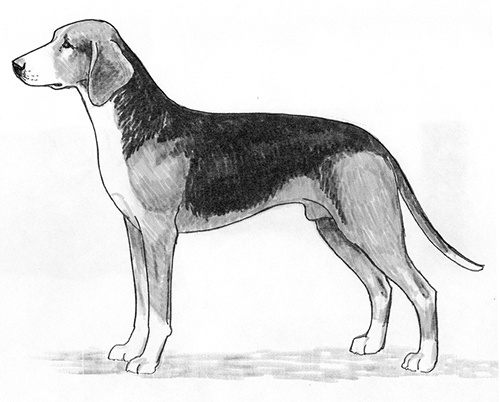Finnish Hound
Scenthound Group
The goals and purposes of this breed standard include: to furnish guidelines for breeders who wish to maintain the quality of their breed and to improve it; to advance this breed to a state of similarity throughout the world; and to act as a guide for judges.
Breeders and judges have the responsibility to avoid any conditions or exaggerations that are detrimental to the health, welfare, essence and soundness of this breed, and must take the responsibility to see that these are not perpetuated.
Any departure from the following should be considered a fault, and the seriousness with which the fault should be regarded should be in exact proportion to its degree and its effect upon the health and welfare of the dog and on the dog’s ability to perform its traditional work.
History
At the beginning of the 19th Century, there were many dogs in Finland that resembled the European hounds. Those dogs were crossed with the Finnish country dogs, and the resultant dogs were the beginning of the Finnish Hound. The first standard was written in 1932. They are used as a fox and hare hunter.
The Finnish Hound was recognized by the United Kennel Club January 1, 1996.
General Appearance
The Finnish Hound is a tri colored, medium sized, short coated hound that is strongly built but not heavy. Males and females should have distinctly marked sex characteristics.
Characteristics
Calm, energetic and friendly.
Head
SKULL
The skull is even in width from the ears to the eyes. It is slightly domed on top. The forehead is slightly convex. The eyebrows and occiput are clearly visible. The stop is slight but clearly defined.
MUZZLE
The muzzle is the same length as the skull. It is moderately deep and slightly tapering, with a straight nasal bridge. The lips are well developed, and the upper lip is beautifully curved.
TEETH
The Finnish Hound has a complete set of evenly spaced, white teeth meeting in a scissors bite.
Disqualifications: Undershot or overshot bite.
NOSE
Large and black.
Disqualification: Dudley nose.
EYES
Medium size, oval in shape, dark brown in color. The eyes look straight forward. The eyerims are black, and the expression is calm.
EARS
Set on a level with the eye, the ears are hanging with the front edge close to the head. When pulled forward they reach halfway to the end of the nose.
Neck
Medium length, muscular and clean, with a slight arch at the crest.
Forequarters
The forequarters are well angulated. The shoulder blade and upper arm are equal in length.
FORELEGS
The legs are straight and parallel, with strong, oval shaped bone. The elbows set well back under and close to the body. The pasterns are slightly sloping.
Body
In proportion, the body is slightly longer than tall. The chest is long, broad, and deep to the elbow. There is visible forechest. The ribs are well sprung. The back is medium length, straight and muscular. The loin is short and powerful, and the croup is gently sloping. There is a slight tuck up.
Hindquarters
The hindquarters are strong and well angulated.
HIND LEGS
The upper thigh is long and broad. The lower thigh is long, sinewy and sloping. There is good angulation at the stifle. The hock is rather low.
Feet
Oval, with well arched, tight toes and springy pads.
Tail
Low set, strong at the root, tapering to the hock. The tail is carried low, not above the line of the back.
Disqualification: Kinked tail.
Coat
Double, with a medium length, straight, dense and harsh outer coat that is close lying and a short, dense soft undercoat.
Color
Typical hound tri colored.
Height and Weight
Height at the withers for males is 21.5 to 24 inches. For females, it is 20.5 to 23 inches.
Gait
Light and long reaching, with a firm level back, and parallel movement of the legs.
Eliminating Faults
(An Eliminating Fault is a Fault serious enough that it eliminates the dog from obtaining any awards in a conformation event.)
Height more than one inch over or under the accepted range.
Disqualifications
(A dog with a Disqualification must not be considered for placement in a conformation event, and must be reported to UKC.)
Unilateral or bilateral cryptorchid.
Viciousness or extreme shyness.
Albinism.
Undershot or overshot bite.
Dudley nose.
Kinked tail.

Looking for a Dog?
Find a dog that will fit your family.
Note: The breeders on this list are not endorsed by UKC.
Revised July 1, 2009
©Copyright 1996, United Kennel Club
